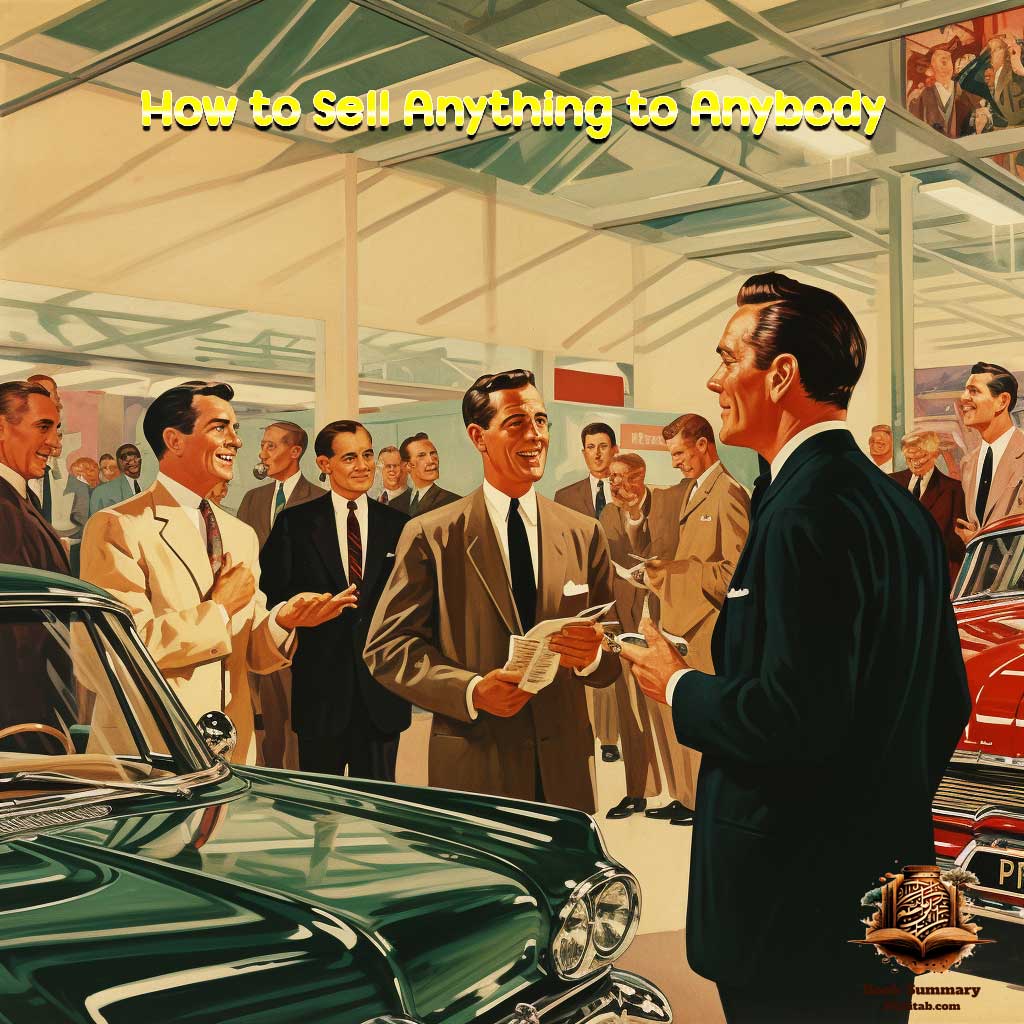
The book “How to Sell Anything to Anybody” stands as one of the most iconic texts in the realm of sales. Authored by the legendary salesman Joe Girard, this work is more than just a guide on sales tactics; it serves as a curriculum on the art of selling. Through Girard’s personal experiences, which have positioned him as a record-holder in the Guinness Book of World Records as the world’s greatest salesman, readers gain unparalleled insights into the intricate world of sales.
Girard doesn’t simply expound on basic sales tactics. Instead, he delves deep into numerous strategies and methods that enhance a reader’s understanding of customer psychology and emphasizes the importance of building strong, genuine relationships. He asserts that success in sales isn’t solely reserved for those born with natural selling prowess; it’s a skill that can be learned, honed, and mastered.
Through the myriad of stories and examples peppered throughout the book, Joe Girard offers readers a unique opportunity to immerse themselves in the sales universe through the lens of one of its most adept practitioners. It’s not just a manual on the art of selling but a testament to the power of determination, resilience, and self-belief.
إقرأ أيضا:مت فارغا: استكشاف طاقاتك الكامنة لتحقيق الإبداع والنجاحTable of contents
How Essential is Personal Branding in Achieving Sales Success?
In today’s hyper-competitive marketplace, the standout theme from the iconic sales manual “How to Sell Anything to Anybody” is undeniably the pivotal role of personal branding in sales. Joe Girard, renowned as one of history’s most prolific salespeople, keenly underscores the significance of carving out a distinctive identity in the cluttered world of selling.
Personal branding isn’t just about crafting a memorable logo or a catchy tagline; it delves much deeper. At its core, it revolves around the establishment of oneself as an embodiment of trust, reliability, and unwavering commitment. In the realm of sales, where choices are abundant, and alternatives are just a click away, customers are more inclined to gravitate towards individuals who exude authenticity and consistency. It’s not merely about the product or service in question, but the face, values, and character representing it.
Girard firmly believed that successful sales are rooted in relationships. And just as relationships are built on trust, successful sales strategies are anchored in reliable personal branding. It acts as the foundation, facilitating the creation of a bond between the salesperson and the prospective customer. This bond can often be the distinguishing factor between a closed deal and a missed opportunity. By positioning oneself as a beacon of trustworthiness and reliability, sales professionals can ensure they not only capture the attention of their target audience but also retain their loyalty in the long run.
In “How to Sell Anything to Anybody,” the takeaway on personal branding is evident: it is the linchpin that holds together all other sales strategies. Without a well-defined personal brand, even the most innovative product or persuasive sales pitch might fall on deaf ears. In essence, mastering personal branding is tantamount to mastering the art of sales itself.
How Does Understanding Customer Psychology Propel Sales Success?
In the transformative guide “How to Sell Anything to Anybody,” the art of grasping customer psychology emerges as an indispensable tool for achieving sales excellence. Recognizing what motivates potential buyers, addressing their innate needs, and allaying their underlying fears can be the difference between a fleeting transaction and a lasting business relationship.
Consumer behavior is an intricate tapestry woven from threads of desires, anxieties, expectations, and previous experiences. To navigate this complex web, sales professionals must don more than just the hat of a seller; they must become intuitive psychologists, attuned to the subtle cues and hidden motivations of their clients.
One of the profound insights from the book highlights that customers often buy based on emotions and justify with logic later. Thus, understanding the emotional triggers can catapult a sales strategy from mediocre to masterful. For instance, if a potential buyer is apprehensive about a product’s longevity, it isn’t merely a functional concern; it might stem from previous experiences of investing in short-lived products, or perhaps an innate fear of making poor financial decisions. Addressing such concerns isn’t only about providing warranty details but weaving a story of trust, long-term value, and assurance.
Moreover, understanding the consumer’s desires, whether stated or latent, and tailoring one’s pitch to resonate with these desires can form an immediate connection. It’s akin to speaking directly to the consumer’s innermost thoughts, validating their feelings, and positioning the product or service as the ideal solution.
In “How to Sell Anything to Anybody,” the focus on customer psychology is not a mere strategy; it’s a philosophy. It underscores that successful sales are not transactions but relationships, and the depth of these relationships is carved from genuine understanding and empathy. Embracing this approach ensures not just immediate sales success but paves the way for sustained growth and customer loyalty.
Business & Finance Management – Book Summary (khkitab.com)
How Do Genuine Relationships Amplify Sales Success in ‘How to Sell Anything to Anybody’?
In the celebrated guide “How to Sell Anything to Anybody,” the emphasis on building and nurturing genuine relationships with customers stands out as a central theme. Sales, as the book illustrates, go beyond just transactions; they’re about forging connections that are rooted in trust and mutual understanding.
Within the world of sales, a quick sale might bring immediate profit, but it is the long-term relationships that ensure sustained business growth. The book teaches that understanding a customer’s needs, preferences, and even apprehensions is essential. However, it’s not just about recognizing these elements but genuinely caring about them. This genuine care forms the foundation of trust, which, once established, becomes the cornerstone of repeat business and referrals.
Moreover, the notion that customers buy from people they trust is revisited multiple times in the text. It’s no longer sufficient to have the best product or the most competitive price. In a market saturated with choices, customers often gravitate towards sellers they feel a personal connection with. They seek authenticity, transparency, and sincerity – traits that build and solidify the bonds of trust.
Further delving into the importance of relationships in sales, the book underscores that every interaction with a customer, whether big or small, is an opportunity to strengthen the relationship. It’s about consistently delivering value, honoring promises, and showing respect at every touchpoint.
In conclusion, “How to Sell Anything to Anybody” provides invaluable insights into the art of sales. It asserts that while sales techniques and strategies are essential, the heart of successful selling lies in cultivating genuine relationships. For in these relationships, built on the pillars of trust and understanding, lies the future of enduring business success.
Our Facebook Page – Book Summary
How Does the Law of 250 in ‘How to Sell Anything to Anybody’ Highlight the Power of Reputation in Sales?
In the world of sales, understanding the dynamics of influence and how reputation propagates is essential. “How to Sell Anything to Anybody” by Joe Girard delves deeply into this concept, particularly through the Law of 250. Girard, recognized as the world’s greatest salesman, introduced this concept as a pivotal cornerstone of salesmanship.
The Law of 250 suggests that each individual, on average, knows about 250 people to whom they might mention you, your product, or your service. These could be attendees at a wedding, funeral, or any significant gathering—an audience with whom one’s experiences and reviews are shared. This insight is not just about numbers; it’s about the ripple effect a single customer’s experience can have.
When a salesperson impresses one customer, that satisfaction could potentially ripple out to 250 others. Conversely, a negative experience could deter not just one potential sale, but an entire network of them. In a time when customer reviews and word-of-mouth have become potent marketing tools, Girard’s concept emphasizes the compounding effects of individual interactions in the sales process.
Yet, the essence of the Law of 250 isn’t simply about broadening reach. It underscores the importance of genuine, authentic interactions. Salespeople shouldn’t see customers as just numbers but should treat every individual as a unique entity with a vast network of connections. Building trust, offering genuine solutions, and ensuring a top-tier experience becomes more than just making a sale; it’s about establishing a positive reputation that can reverberate far and wide.
In conclusion, “How to Sell Anything to Anybody” offers a profound lesson for anyone in the sales field. The Law of 250 isn’t merely a strategy; it’s a paradigm shift. It reminds salespeople of the larger picture—beyond the immediate sale lies an expansive web of potential customers and referrals, all hinging on one’s reputation and the experiences they deliver. Thus, each sale isn’t just a transaction; it’s an opportunity to influence, positively or negatively, a much larger audience.
How Does ‘How to Sell Anything to Anybody’ Unveil Game-Changing Sales Techniques for Modern Sellers?
In today’s ever-evolving marketplace, the approach to sales requires constant refining and adaptation. Joe Girard’s “How to Sell Anything to Anybody” stands out as an essential guide, offering time-tested strategies coupled with innovative insights for the modern sales professional. This book offers much more than just a collection of techniques—it presents a philosophy of sales deeply rooted in understanding human behavior.
One of the book’s central tenets is that selling isn’t just about pushing a product but about forging genuine relationships. Girard emphasizes the importance of truly understanding the needs, desires, and fears of potential buyers. By adopting a customer-centric approach, sales professionals can tailor their pitch, making their propositions more appealing and relevant to the individual buyer’s context.
Moreover, the book dives deep into the art of handling objections—a skill every salesperson must master. Girard provides practical advice on how to navigate these challenges, emphasizing the need to listen actively, empathize with the client’s perspective, and offer solutions rather than defenses. Instead of seeing objections as roadblocks, “How to Sell Anything to Anybody” teaches salespeople to view them as opportunities to further engage and understand their clients.
Furthermore, the art of closing deals is given significant attention. Girard proposes that closing isn’t a singular event but a process that begins the moment the conversation starts. By building trust, demonstrating value, and ensuring a mutual understanding from the outset, the close becomes a natural culmination of the sales dialogue.
To top it all, “How to Sell Anything to Anybody” offers invaluable insights on follow-up techniques, underscoring the significance of after-sales service. Girard firmly believes that the sales process doesn’t end once a deal is closed; nurturing post-sale relationships can lead to repeat business and referrals, amplifying one’s sales results exponentially.
In essence, Joe Girard’s book isn’t just about selling more; it’s about selling better. It challenges sales professionals to elevate their approach, making sales an exercise in building relationships, understanding human behavior, and consistently delivering value. For those serious about mastering the art of sales, “How to Sell Anything to Anybody” is an indispensable resource, offering a roadmap to sales success in any industry.
Why is Persistence and Follow-up a Game-Changer in Sales According to ‘How to Sell Anything to Anybody’?
In the competitive world of sales, the importance of persistence and follow-up cannot be overstated. Joe Girard, in his iconic book “How to Sell Anything to Anybody”, dives deep into this concept, shedding light on how these two elements can often be the deciding factors between a successful salesperson and an average one.
At the heart of Girard’s teachings is the belief that selling does not end once a deal is closed. While making the sale is certainly a milestone, the journey with the customer is just beginning. This is where the power of follow-up comes into play. It ensures that the customer is satisfied with their purchase, resolving any potential issues or concerns they might have. This not only improves customer satisfaction but also reinforces their trust in the salesperson and the product or service they’ve purchased.
But why is persistence equally important? In the landscape of sales, not every potential lead converts immediately. Rejections and delays are part and parcel of the sales process. However, Girard emphasizes that these rejections are not always definitive. Many times, a ‘no’ is just a ‘not now’. This is where persistence becomes crucial. It’s about understanding that rejection is a part of the process, but with the right approach and timing, a potential ‘no’ can be turned into a ‘yes’.
Furthermore, the combined strategy of persistence and follow-up can lead to repeat business. When customers feel valued and cared for, they are more likely to return for future purchases. They recognize the effort put into ensuring their satisfaction, and this translates to trust and loyalty.
In essence, “How to Sell Anything to Anybody” stresses the importance of viewing sales as a long-term relationship rather than a one-off transaction. By embracing persistence and consistently following up with customers, salespeople can ensure not only immediate sales success but also cultivate a loyal customer base that leads to sustained business growth. This holistic approach to sales, as proposed by Girard, is what sets apart top-tier sales professionals from the rest.
How Does Post-Sale Service Transform One-Time Buyers into Loyal Brand Advocates According to ‘How to Sell Anything to Anybody’?
In the world of sales and customer service, it’s often said that the sale is just the beginning of a relationship, and Joe Girard’s “How to Sell Anything to Anybody” strongly underscores this perspective. One of the focal points of this classic guide is the role and significance of post-sale service. Let’s delve into this crucial aspect and understand its importance.
1. Building Long-Term Relationships: In “How to Sell Anything to Anybody”, it’s clear that a sale is not just a transaction. It’s an opportunity to forge a bond with the customer. By offering exemplary post-sale service, companies not only address immediate concerns or questions related to the purchased product or service but also show the customer that they’re valued even after the sale.
2. Mitigating Potential Issues: No product or service is perfect. By providing proactive post-sale service, businesses can anticipate and address potential issues before they escalate, ensuring a positive overall customer experience.
3. Turning Customers into Advocates: Satisfied customers are the best promoters. When they receive excellent post-sale service, they’re more likely to share their positive experiences with friends, family, and their broader networks. This word-of-mouth promotion is invaluable, and according to Girard, plays a pivotal role in attracting new customers.
4. Encouraging Repeat Business: One of the foundational principles in “How to Sell Anything to Anybody” is the idea that it’s easier and more cost-effective to retain an existing customer than to acquire a new one. Effective post-sale service ensures that customers return, turning one-time buyers into repeat clients.
5. Setting the Brand Apart: In a competitive marketplace, post-sale service can be a distinguishing factor. While many companies can offer similar products or services, not all invest in quality post-sale support. By doing so, businesses can set themselves apart and position themselves as industry leaders.
In conclusion, Joe Girard’s “How to Sell Anything to Anybody” goes beyond the initial sale, emphasizing that genuine success in sales is about the entire customer journey. By prioritizing post-sale service, companies not only enhance their reputation but also create a loyal customer base that supports and promotes the brand for the long haul.
How Does ‘How to Sell Anything to Anybody’ Address the Importance of Self-Belief and Resilience in Sales?
In the competitive landscape of sales, mental fortitude stands as the unsung hero. Joe Girard, in his enlightening book “How to Sell Anything to Anybody,” underscores the significance of self-belief and resilience. Here’s a deep dive into these mental aspects of sales, as gleaned from Girard’s insights:
1. Foundation of Success: Girard posits that self-belief isn’t just a motivational tool—it’s the bedrock of success. Before convincing anybody about a product, a salesperson must first believe in themselves. This conviction radiates authenticity, making a pitch more compelling.
2. Battling Inevitable Rejections: In “How to Sell Anything to Anybody,” Girard doesn’t shy away from the reality of rejections in sales. He emphasizes that rejections are not a reflection of personal worth but a natural part of the sales process. Resilience enables salespeople to view rejection as feedback, fine-tuning their approach rather than getting discouraged.
3. The Power of Persistence: Drawing from his own experiences, Girard showcases numerous instances where resilience and persistence transformed potential failures into remarkable successes. He impresses upon readers that sometimes, sales is a numbers game, and persistence can often tilt the odds in one’s favor.
4. Self-Belief Fuels Motivation: A key highlight of the book is the idea that self-belief is intrinsically linked with motivation. When salespeople genuinely believe they can make the sale, they’re more driven, creative, and enthusiastic in their approach.
5. Overcoming Setbacks: Every salesperson will face setbacks, be it challenging clients, economic downturns, or personal hurdles. “How to Sell Anything to Anybody” delves into strategies for harnessing inner strength and bouncing back, emphasizing the idea that setbacks are mere stepping stones to greater achievements.
6. Continuous Learning and Growth: Resilience, as Girard explains, also pertains to a growth mindset. Embracing every experience, good or bad, as a learning opportunity keeps salespeople adaptable and ahead of the curve.
In conclusion, Joe Girard’s “How to Sell Anything to Anybody” is more than just a guide on sales techniques; it’s a masterclass on the psychology of selling. For Girard, mastering one’s mindset and emotions is just as crucial, if not more so, than mastering the art of the pitch. The sales realm is not for the faint-hearted, and this book serves as a beacon for those brave souls navigating its challenging waters.
Why is Continuous Learning Imperative for Salespeople as Explained in ‘How to Sell Anything to Anybody’?
In the iconic sales guide, “How to Sell Anything to Anybody,” the renowned sales expert Joe Girard underscores the importance of continuous learning for sales professionals. Let’s delve deep into this subject, illuminating the rationale and strategies Girard puts forward for perpetual skill enhancement:
- Adapting to a Dynamic Market: Joe Girard asserts that the market is ever-evolving. With technology advancements, changing consumer behaviors, and emerging global trends, what worked yesterday might not necessarily work today. Salespeople who don’t continually learn risk becoming obsolete.
- Building Credibility with Clients: Girard emphasizes that well-informed salespeople are perceived as credible experts. When a salesperson is updated with the latest industry trends, product knowledge, or sales techniques, they can engage in meaningful conversations with potential clients, establishing trust.
- Personal Growth Equals Sales Growth: According to Girard, the personal development of a salesperson directly influences their sales performance. Expanding one’s knowledge base ensures that the salesperson can approach different situations with novel strategies, leading to more closed deals.
- Overcoming Sales Plateaus: Every salesperson, at some point in their career, hits a sales plateau. Girard believes that continuous learning is the key to breaking through these barriers. By introducing new techniques or perspectives, salespeople can rejuvenate their selling approach.
- Harnessing New Tools and Technologies: The digital age brings forth a plethora of tools designed to optimize sales processes. Girard’s insights suggest that by staying updated with these tools, and learning how to utilize them effectively, salespeople can gain a competitive edge.
- Boosting Confidence and Morale: There’s an undeniable confidence that comes with mastery. Girard mentions that as salespeople upgrade their skills and deepen their knowledge, they become more confident in their pitches and client interactions, leading to increased motivation and higher sales.
- Networking Opportunities: Continuous learning often involves attending workshops, webinars, or courses, which offer networking opportunities. Girard hints that networking isn’t just about making contacts; it’s about learning from peers and understanding market dynamics from different viewpoints.
In summary, “How to Sell Anything to Anybody” isn’t just about the art of selling. It’s a clarion call for salespeople to engage in lifelong learning. In Girard’s perspective, staying updated, adaptable, and hungry for knowledge isn’t just beneficial – it’s essential for anyone aiming for lasting success in the world of sales.
Why is Ethical Behavior Essential in Sales as Highlighted in ‘How to Sell Anything to Anybody’?
In Joe Girard’s renowned sales manual, “How to Sell Anything to Anybody,” a significant emphasis is placed on the role of ethics in sales. Let’s dive deep into this aspect, showcasing the primary reasons Girard stresses the values of honesty, integrity, and transparency in sales:
- Building Trust: At the heart of any successful sales transaction lies trust. Customers are more likely to purchase from, and remain loyal to, salespeople who are honest and transparent in their interactions. Girard repeatedly points out that misleading a customer might result in a short-term gain, but it will almost certainly lead to long-term losses as trust is eroded.
- Reputation in the Market: In today’s digitally-connected world, a company’s reputation can be bolstered or damaged rapidly. Ethical sales behavior plays a pivotal role in how a company is perceived. “How to Sell Anything to Anybody” underscores that word-of-mouth, now amplified by social media, can make or break a salesperson’s career.
- Long-Term Customer Relationships: Ethical salespeople focus on creating value for the customer and ensuring their needs are genuinely met. This fosters long-term relationships, with clients returning for repeat business and recommending the salesperson to others.
- Internal Morale and Company Culture: Salespeople who practice ethical behavior contribute positively to the company culture. Their actions set a standard for others to follow, leading to a more positive and cohesive work environment.
- Navigating Challenging Situations: Sales, by nature, comes with its set of challenges. Girard highlights that approaching challenges with honesty and integrity makes it easier to navigate them. When problems arise, ethical salespeople own up to mistakes, make amends, and learn from them.
- Staying Ahead of Regulations: In many industries, sales activities are regulated to ensure consumer protection. Salespeople who maintain high ethical standards are less likely to run afoul of these regulations, avoiding potential legal repercussions.
- Personal Fulfillment: Beyond the business implications, Girard touches upon the personal satisfaction that comes from knowing you’re doing the right thing. Ethical behavior in sales not only ensures success in the business realm but also contributes to personal growth and self-respect.
In conclusion, while “How to Sell Anything to Anybody” offers numerous strategies and techniques for succeeding in sales, the emphasis on ethics stands out as a cornerstone. Girard’s message is clear: Ethical behavior isn’t just a moral obligation; it’s good for business and essential for sustainable success in sales.








